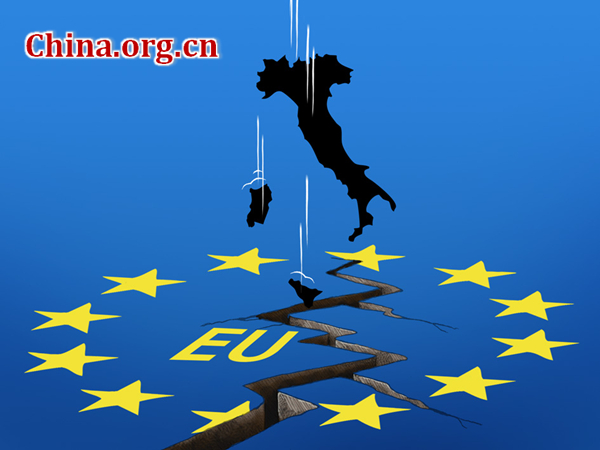Eurozone not in danger by Italian 'no'
china.org.cn / chinagate.cn by George N. Tzogopoulos, December 19, 2016 Adjust font size:
|
|
|
Italy's 'No' vote [By Zhai Haijun/China.org.cn] |
The expected outcome of the Italian referendum, in which the "no" vote gathered approximately 60 percent, has led to the resignation of Prime Minister Matteo Renzi. Italy has already found its new premier under former Foreign Minister Paolo Gentiloni, but this will possibly lead to a snap election. The importance of these developments goes beyond the boundaries of the country. As the third largest economy in the eurozone, it theoretically has the gravitas to cause shocks.
Several mainstream media and analysts already anticipate an exit of Italy from the common currency. The National Interest, for instance, published an article titled "Why Italy could leave the Eurozone." The CNN website is also speculating whether the result is "the first step toward leaving the EU." Even before the referendum the Financial Times had predicted that it would hold "the key to the future of the euro."
But the ongoing European debt crisis has seriously traumatized the reliability of many journalists and commentators. Many times they failed to correctly assess the situation. More importantly, they have often sparked uncertainty with their reports, stories and articles fueling scenarios for bankruptcies of problematic countries or a breakup of the Eurozone. The coverage of the Greek crisis by the media since 2010, for example, has been full of inaccuracies and incorrect estimations.
Ιt is not the first time since 2010 that Italy has encountered an internal crisis. In November 2011 Silvio Berlusconi resigned paving the way for a technocratic government under former EU Commissioner Mario Monti. And in February 2014, Enrico Letta also submitted his resignation after his Democratic Party - largely guided by Renzi - questioned his ability to govern. This is how the latter came to power without winning a single election with the exception of the rather indifferent European Parliament one of May 2014. And now, in December 2016, he is replaced by Gentiloni.
Renzi was regarded by elite EU politicians as an ideal reformist who is the only solution for the salvation of his country. However, previous experience - as noted above - suggests that Italy was able to find leaders amid domestic crises. It is remarkable that in 2014 the BBC had portrayed the then mayor of Florence - before succeeding Letta - as "a politician in a hurry" who personified "the frustration felt by many Italians at the apparent inability of his country's leaders to deal with Italy's rapid economic decline." Exaggerations do not help the European cause.
From another perspective, some fear that a snap election could signal the beginning of a new political era in Italy, with Beppe Grillo of the Five Star Movement and Matteo Salvini of the Northern League party becoming winners. It is currently unclear which electoral law will be applied in the next parliamentary elections. On January 24, 2017 the Italian constitutional court will hold a hearing on the legitimacy of Renzi's new electoral law, known as italicum. No one knows though when the final ruling will be made.
If the Five Star Movement and the Northern League party manage to finally win the new election benefitted by Renzi's idea, it will be questionable whether they can practically exert an anti-EU policy. Grillo has promised to organize a referendum on whether Italy should stay in the euro area, and Salvini's policy is based on the slogan "it is enough with the euro." It is always particularly easy to promise almost everything while being in the opposition. But when coming into government constraints become evident almost immediately. Greek Prime Minister Alexis Tsipras has grounded his political and personal success on the illusion that another way could be possible. After he won the national election of January 2015, however, it took him five months to realize reality and sign a painful accord in order to keep Greece in the eurosystem.
Citizens in member-states of the Eurozone have the right to approve or reject incumbent governments and their proposed policies. This is also the case with Italy. The way ahead will be difficult for the country during Gentiloni's administration and also after the early election. Structural weaknesses, anemic growth and the problematic banking sector would have been the principal challenges even if a "yes" vote had prevailed on December 4. The discussion on an exit from the Eurozone and the hiding of the truth from public opinion for temporary political benefits only deteriorates the situation. All in all, Gentiloni should on the one hand pay attention to the stabilization of the national banking sector and on the other, respond to ordinary people's needs respecting current economic restraints.
George N. Tzogopoulos is a columnist with China.org.cn. For more information please visit:
http://www.china.org.cn/opinion/GeorgeNTzogopoulos.htm
Opinion articles reflect the views of their authors, not necessarily those of China.org.cn.
